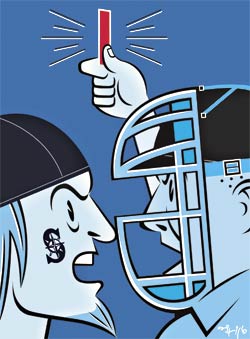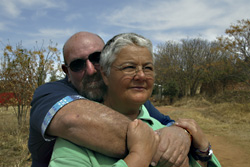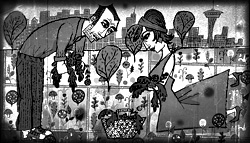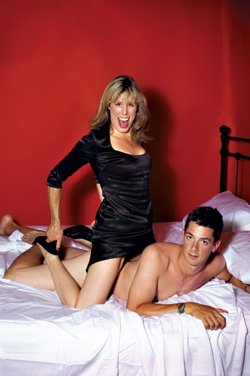Last summer, Drew Wattula and two friends settled into their outfield seats at Safeco Field to watch the Mariners play the Boston Red Sox. The warm, sunny Saturday afternoon was perfect for a ball game and was rendered even more ideal when the Sox opened up a big lead, to the delight of Wattula, who had just moved from Cambridge, Mass. As they stockpiled empty beer cups, Wattula and his friends—one a fellow Sox fan, the other a die-hard Mariners fan—bantered and joked with one another.
“The Sox were absolutely dominating the Mariners, and we were talking shit to my buddy,” Wattula recalls. “He started trying to rally the Seattle fans, putting on his cap inside-out, being generally rowdy but not disrespectful. People around us thought it was funny, but I guess people behind us didn’t.”
Near the end of the game, a seating host (Safeco’s term for “usher”) appeared, holding a red slip of paper. She presented it to Wattula and his friends and informed them that they needed to leave. “You violated the code of conduct,” she said.
The surprised men inspected the card. One side listed Safeco’s code of conduct and unacceptable behaviors:
•Foul/abusive language or obscene gestures
•Intoxication or other signs of impairment related to alcohol consumption
•Displays of affection not appropriate in a public, family setting
•Obscene or indecent clothing
•Any disruption of a game or event, including throwing of objects or trespassing on the playing field or other restricted areas
•Sitting in a location other than the guest’s ticketed seat
•Fighting, taunting or making threatening remarks or gestures
•Smoking or the use of tobacco products, in any form
On the other side: “If you receive this card, we believe that your behavior has crossed this line….Continued abusive behavior will require us to eject you from the ballpark without refund—something we don’t want to do.”
Wattula’s initial reaction was to think the card was a joke, but the usher wasn’t kidding. “We were astounded that what we thought was normal weekend ball game behavior was causing us to get warned,” he says.
The men argued that they were acting as any other fans would at a baseball game, but the usher wouldn’t budge. The trio grudgingly got up to leave.
Whether by nature or nurture, Seattle fans have a deserved reputation for being some of the nation’s best behaved. At a recent homestand against the New York Yankees, visiting fans started up “Let’s go, Yankees” chants on two separate occasion, and the boos that eventually drowned them out were delayed and sounded almost grudging. Perhaps it’s no surprise, then, that the Mariners were the first team in Major League Baseball to designate family sections, in 1982, that prohibited the purchase or quaffing of alcohol. And according to the vice president of ballpark operations, Scott Jenkins, the team was one of the first to develop a fan code of conduct.
The red cards were instituted last season. Jenkins says that although they’re not exactly analogous to those a soccer referee shows an offending player before sending him off the field, they do serve to notify a fan that his behavior has become intolerable. The red cards are employed differently depending on the usher and the situation. Some use them as a final warning. Others, like the one in Wattula’s section, actually use them as a soccer referee would. And still others dispense them at the first sign of trouble as preventative measures. Safeco ushers are also armed with pagers, with which they can call security, housekeeping, or medical personnel with the push of a button.
According to Jenkins, the cards are employed infrequently. Ruth Wilson, in her sixth year as a Safeco usher, still has the original red card that she was issued last season. Mostly, the diminutive, gray-haired woman “well into my 70s” relies on her appearance to defuse situations, though she notes that “the amount of explaining you can do is directly related to how much they’ve had to drink.”
“Everybody has a grandma, so I can hit the right pitch when I talk with them,” she says, eyes twinkling. “I tell them, ‘I expect better from you.’ I’ve been known to drop young men to their knees when I say, ‘I am so disappointed in you.'”
Wilson says the loudest objections always come from opposing fans, usually New York or Boston boosters. “They get confused when I say, ‘We don’t do that here,'” she says.
Wilson says that while she actively scans her sections for bad language and aggressive body language, a stray F-bomb doesn’t necessarily earn a red card. If she notices someone working a little too blue in the stands, she always has a discussion with either her supervisor or another usher first to determine if she should intervene. The same goes for objectionable T-shirts. Wilson says that when the Mariners tried to ban “Yankees Suck” shirts, the backlash was so strong that the club rescinded the rule. “If someone’s sitting there calmly, not instigating anything, just taking in the game, while wearing a not-nice shirt, we leave them alone,” she says.
As Wattula and his friends prepared to leave the stadium, other fans in the section began booing the usher, heckling her for acting like a Keystone Cop. Eventually, the usher backed off and allowed the trio to stay, but the experience left Wattula nostalgic for his hometown ballpark. “[Our behavior] was such child’s play compared to Fenway Park,” he says.
But these days, every team in the league has at least a basic set of guidelines for stadium behavior, including Boston’s aforementioned cathedral of boozy fandom. When new ownership took control of the Red Sox in 2003, the club devised an official code of conduct, which it passed out to fans, announced over the public address system, and reiterated on the scoreboard throughout the game. According to team spokesperson Charles Steinberg, the team aggressively polices foul language and drunkenness, and tolerance for the stereotypical Beantown bleacher creature appears to be waning. Steinberg says that so far this year, Fenway Park security has ejected a record number of noncompliant fans.
Still, Jenkins allows that regional idiosyncrasies in the enforcement of conduct codes remain. Before coming to Seattle last year, he worked for the Philadelphia Eagles and Milwaukee Brewers. “They’re tough fans, and they express themselves in ways that we don’t allow here,” he says. “There is a difference.”
However proactive ushers try to be in monitoring the crowds, they’re greatly outnumbered by the ticket holders, and all ballparks depend on the initiative of fans to make a complaint. But doing so sometimes exposes the fan to even worse behavior, and potential retaliation. To protect whistle-blowers, the Seattle Seahawks have set up a phone number that connects fans to Qwest Field’s control room (Fenway Park and Citizens Bank Field in Philadelphia also offer this service; Safeco does not), which will then dispatch a team employee to investigate the situation. This season, Seahawk fans will also be able to send text messages to security personnel. “Our philosophy is it’s the fans’ stadium, so we try to empower them to help create the experience around them,” says Seahawks spokesperson Suzanne Lavendar.
Qwest ushers also handle games for Seattle’s resident soccer team, the Sounders, who play their home matches at the football stadium. Soccer has a long tradition of raucous fans, and the Sounders boast the Emerald City Supporters. But instead of censoring the ECS’s passion, the Sounders, who averaged 3,700 fans last season, isolate it by allowing them to carve out their own space in the 67,000-seat facility. Now, most fans know that if they sit near section 113, they’ll likely hear objectionable language.
According to Sounders spokesperson Mati Bishop, fans who do bristle at the coarse language of the ECS are first educated—”Hey, this is how it is”—and then offered relocation. “We’re lucky that there’s more than enough stadium that we can move them to another great seat,” says Bishop.
Having a designated anything-goes section also gives the Sounders an alternative to ejecting a fan who becomes a bit too impassioned for tamer climes. “If someone’s getting a little too rowdy, they just throw them into the supporters’ section,” says Bishop.
This season, Safeco began employing snoops who score ballpark staff on their responsiveness to bad language and tense situations in the crowd, among other things. It’s all part of the ongoing effort to keep the stadium family-friendly, but Jenkins rejects the idea that such measures result in a sterile atmosphere.
“Ultimately, for the few people who get constrained by it, there are many, many more people who enjoy the absence of that behavior,” he says. “The code of conduct is there to ensure that everyone has a good time, and it’s not anything you wouldn’t expect in any other public setting. Would you want to go to a restaurant where people are swearing and taunting each other?”








